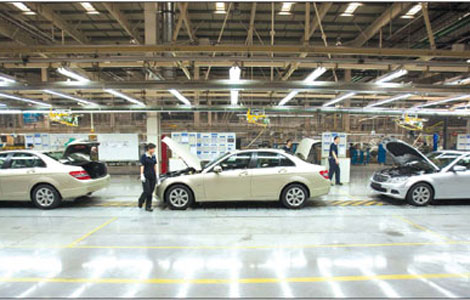Op-Ed Contributors
Joining the threads of civil society
Updated: 2011-03-05 07:48
By Andreas Fulda (China Daily)
The term "civil society" means different things to different people. It can be generally defined as a body of voluntary citizens' groups which aim to protect or extend their interests and values vis--vis the market or state.
In the West, we commonly describe such groups for what they are not - non-governmental organizations (NGOs). In China academics are more inclined to see these vanguards of organized society for what they are - civil society organizations (CSOs).
The role that civil society plays in the public affairs of the state can vary markedly from East to West, often widening the gulf of misunderstanding that lurks between the two. Depending on one's point of view, civil society can also be understood as a particular set of institutionalized relationships between state and society based on the principles of citizenship, civil rights, representation and the rule of law.
Europeans who visit China are sometimes astonished, and subsequently irritated, by the extent of the cooperation between civil society and the government. Immersed in a Western perspective, they expect civil society to be critical of the government, holding its actions up to the highest scrutiny.
While this is indeed a crucial element of Western society, it is an idealized portrayal. When Chinese visit Europe they are often surprised to see that NGOs have forged strong links with those in power and have secured access to high levels of government funding.
This interaction with their European counterparts enables Chinese CSOs, for whom state funding is minimal, to be aware of the avenues potentially open to them and press for government funding in future.
It is all too easy for Europeans to underestimate the achievements of civil society in China, which is still in the early stages of development. Yet it has managed to achieve significant results while striving to retain a balance between ensuring it remains a legitimate actor in the functioning of Chinese society and making a meaningful contribution to social and political development.
The need to address these existing misconceptions is behind our move at the University of Nottingham's School of Contemporary Chinese Studies to establish an EU-China Civil Society Dialogue on Participatory Public Policy, backed by a 1 million grant from the European Commission.
From 2011 to 2013, the program will foster durable and sustainable links between European and Chinese civil society stakeholders in eight policy areas, including climate change, labor relations and social entrepreneurship, with the aim of encouraging public participation in China's experimentation-based policy making process.
On a practical level, it is hoped that increased engagement between European NGOs and Chinese CSOs will tackle an obstacle that should not be underplayed: the language barrier. Many groups both in China and the European Union (EU) have expressed a wish to work together but simply find it impossible to communicate their ideas. The program is also designed to ensure European NGOs look more favorably on the accomplishments of Chinese CSOs.
Chinese CSOs have widely encouraged philanthropy in the country and spurred the establishment of an increasing number of charitable foundations. In many cases, the Chinese government has been supportive of CSOs, particularly in policy fields such as community services, empowerment of women and environmental protection.
While Chinese officials are inclined to keep a rein on the growth of Chinese CSOs, they are keenly aware of the need to mobilize communities and encourage active public participation to solve some of society's most pressing problems.
There is a growing interest among local officials - providing there is no conflict with central government edicts - to engage with CSOs as part of their efforts to meet objectives passed down from the top. But for all the progress that has been made, there have been setbacks on the road to developing a more participatory civil society in China and the situation varies wildly from region to region.
Civil society success stories in China are concentrated around Beijing and the north, and the provinces of Yunnan and Sichuan. But the development of CSOs in the richer provinces of Guangdong, Jiangsu and Zhejiang has lagged behind, mostly because of the prevailing business culture and the dominant preoccupation with making money.
The EU represents cultures, thoughts and agendas of vastly different countries but this diversity will be an advantage when it comes to promoting civil society values and ethics in China. If China is to become a more open and plural society, it will benefit from tapping into ideas from European civil society which can offer a set of innovative solutions to common problems.
The author is a lecturer at the University of Nottingham's School of Contemporary Chinese Studies.
E-paper

Factory fever
Despite auto manufacturing bubble scare, car giants gear up expansion of factories.
Dressed for success
Fabric of change
High spirits
Specials

Earthquake Hits Japan
A massive 8.8 magnitude quake hit the northeast coast of Japan on March 11,2011.

NPC & CPPCC sessions
Lawmakers and political advisers gather in Beijing to discuss major issues.

Slide: Japan quake
Devastating earthquake and tsunami left millions without water, electricity, homes or heat.
